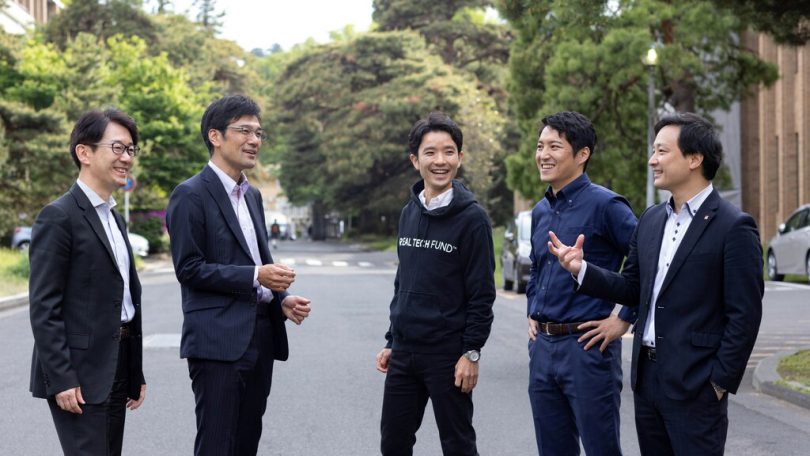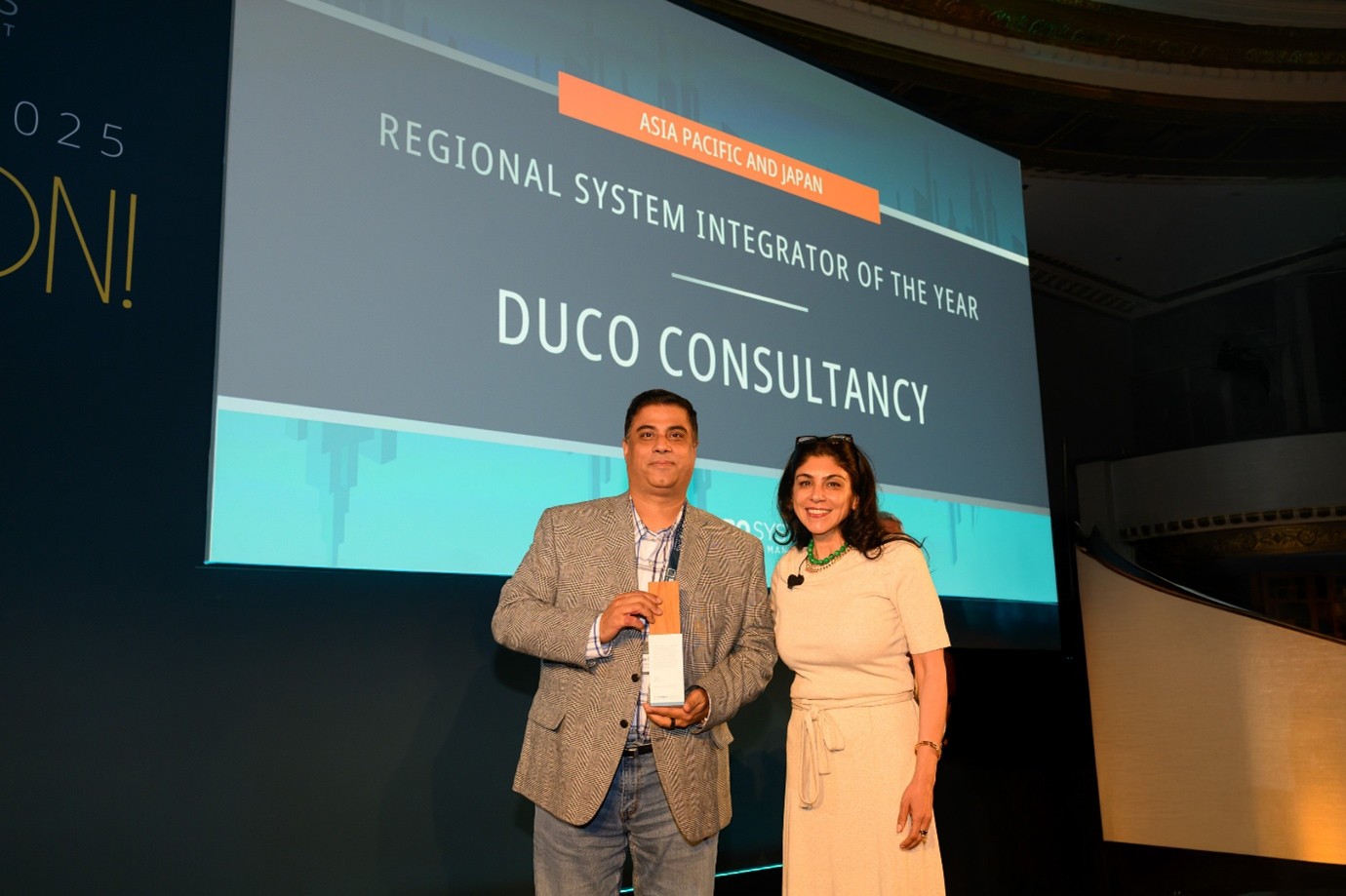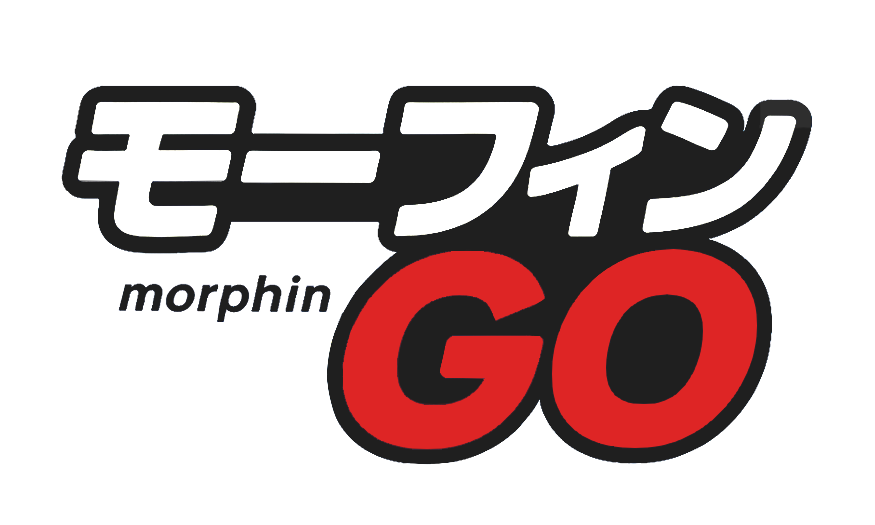3DC Inc., a Tohoku University-affiliated carbon materials startup, has raised its first financing from Real Tech Fund. In parallel with this financing, 3DC has been adopted within NEDO’s entrepreneur program (NEP). 3DC, Inc. was co-founded in February 2022 by CEO Takuma Kuroda, former venture capital investment manager, and CTO Hirotomo Nishihara, professor at Advanced Institute for Materials Research (AIMR) Tohoku University. 3DC Inc. is aiming to commercialize a new type of carbon material: graphene mesosponge (GMS), which has been developed by a team led by Dr. Nishihara.
(Left-right) Shin-ichi Orimo, Director and Professor at Advanced Institute for Materials Research (AIMR), Tohoku University; Hirotomo Nishihara, 3DC Inc. CTO and Professor at AIMR; So Yanbe, Real Tech Fund Growth Manager; Takuma Kuroda, 3DC CEO; Yukihiro Maru, 3DC. Advisor and Leave a Nest Co., Ltd. Founder Group CEO
■ What is Graphene Meso-Sponge (GMS)?
Graphene mesosponge (GMS) is a new type of porous carbon that has a sponge-like mesoporous framework consisting mostly of single-layer graphene walls. While the conventional carbon materials (e.g. fullerenes, nanotubes and graphene) face challenges with durability and production cost, GMS is expected to overcome such issues because of its three-dimensional structure.
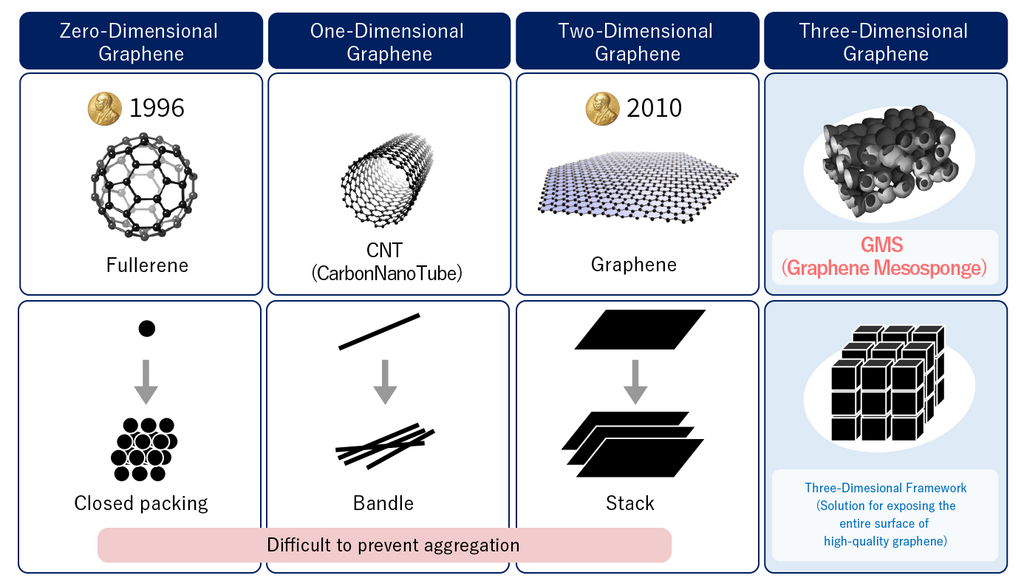
This unique 3D structure enables GMS to simultaneously possess seemingly incompatible properties: the advantages of graphene-like carbon materials (high conductivity and high oxidation resistance) and porous carbons (large surface area).
3DC has committed to developing low cost and sustainable production methods for GMS. Upon the establishment of production, GMS will be used for numerous applications. As one example, GMS is expected to improve both operating voltage and energy density when it is used for electrochemical capacitors as the electrode active material.
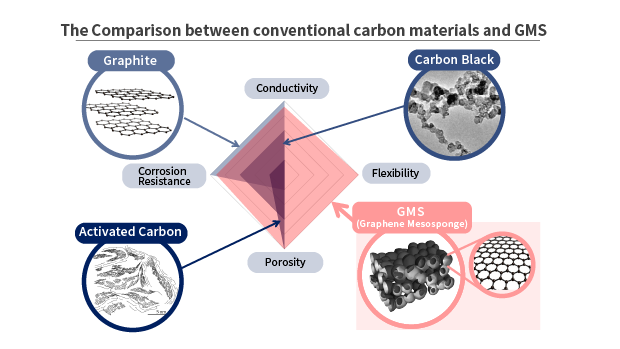
If you are interested in more information about GMS, joint research with 3DC, or an R&D job at 3DC, please feel free to contact us.
Contact: https://www.3dc.co.jp/#contact , E-mail:info@3dc.co.jp
■ About 3DC Inc.
3DC is a Tohoku University-affiliated carbon materials startup aiming to commercialize GMS. Dr. Nishihara, Chief Technology Officer of 3DC, has been well known as one of the leading experts in the field of carbon research and was selected as one of the Asian Scientist 100 in 2020. Dr. Nishihara has obtained the material patents for GMS as an inventor including JP6460448B2.
In addition to its scientific research assets, 3DC also has impressive business development capabilities; Mr. Yukihiro Maru, CEO of Leave a Nest Co., Ltd., has been on the advisory board since its founding.
Currently 3DC has been working on the research and development of GMS, aiming at commercialization from 2024 on, in partnership with Japanese and foreign manufacturers of batteries, automobiles, and so on. Our hope is to contribute to a sustainable future society with next generation electrochemical energy storage devices enhanced by GMS.
■ Battery Market as a Major Application Target of GMS
Based on the features of GMS, its main application market is expected to be batteries: from lithium-ion batteries to next generation batteries including lithium-sulfur batteries and fuel cells.
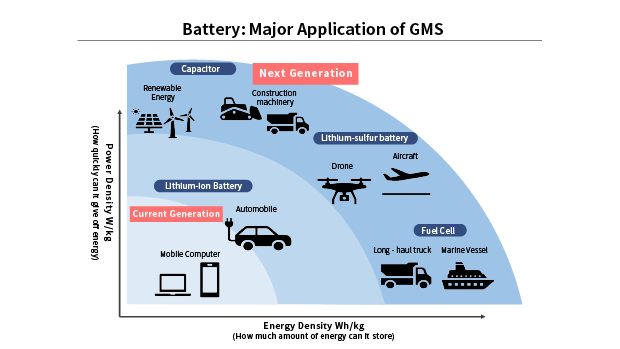
■ The features of Graphene Mesosponge (GMS)
GMS consists of a single-layer graphene sheet with almost no defects. This graphene sheet is slightly twisted which generates enough curvature to create a three-dimensional porous structure, which enables GMS to possess its unique properties. For instance, GMS has a significantly larger surface area, a property that determines the performance of electrodes, than carbon black. Because of this characteristic structure, it has unique features such as being chemically stable and physically flexible.

The features of GMS and its effect on battery, which is considered as its main application, can be summarized as follows;
1. Chemical and physical durability contributes to longer-life batteries.
GMS has a very small amount of edge sites where chemical reactions easily happen. Therefore, implementing GMS into batteries makes it possible to maintain the performance of pure carbon graphene itself. In addition, because of its physical flexibility, GMS absorbs expansion and contraction of electrodes so that it can prevent batteries from mechanical degradation.
2.High porosity enlarges battery capacity
GMS has a rather higher porosity than conventional carbon materials. It can therefore include a large amount of active material inside its pores, and as a result, contribute to enlargement of battery capacity.
3.Customizability of physicochemical properties increases material design freedom
While graphene consists of a flat single-layer carbon structure which limits its material design freedom, the free-standing structure of GMS has high flexibility. This flexibility of structure leads to high customizability of its physicochemical properties and a high degree of material design freedom.
.
Expected Effect on Energy Storage and Power Generation Devices
● Supercapacitor : Higher voltage and energy density by improving voltage stability
● Lithium-ion battery : Higher capacity, higher voltage and longer-life
● Fuel Cell : Reduction of precious metal catalyst usage by making the catalyst more efficient and extending its cycle life
● Lithium-sulfur battery and all solid state battery : Longer-life and higher temperature durability owing to its flexibility toward expansion and contraction
● Air cell : Higher capacity and longer-life
■ CEO: Takuma Kuroda

I have been involved in supporting the commercialization of technology seeds with a passion to create businesses from academia, which I believe will revitalize Japanese industry. Initially, I was involved in this project as one of its supporters, but I came to be aware of the astonishing potential of GMS and decided to co-found 3DC. We hope that many people will experience the excellent performance of this material, and join us in building the infrastructure for the next generation from Japan.
■ CTO: Hirotomo Nishihara Ph.D. (Professor at Advanced Institute for Materials Research, Tohoku University)

GMS is a Japanese-born, new carbon material that has unique characteristics that make the impossible possible: GMS has the power to make battery devices possess higher performances and longer-life. We believe that the development of new carbon materials can help realize a low-carbon (emission) society.
■ Advisor: Yukihiro Maru Ph.D. (Founder and Group CEO, Leave a Nest Co., Ltd.)

I first met Dr. Nishihara in 2021 at the “Deep Tech Grand Prix 2021″ held by our company, Leave a Nest. I was strongly impressed not only by the technological innovation of “Graphene Mesosponge,” but also by Dr. Nishihara’s passion to change the world. Having Mr. Kuroda, a young entrepreneur, joining the company was also a very positive factor as well.We all know that it is not easy to realize a carbon neutral society, but it is clear that breakthroughs in batteries are essential to the world we live in today. We are delighted to help found the company with a passionate team led by Mr. Kuroda and Mr. Nishihara, to witness the birth of 3DC and its start-off as a deep-tech startup.
■ Investor: Sou Yanbe (Growth Manager, Real Tech Fund)

Higher performance and longer life of batteries are essentially needed as the importance of electrification advances in various industries. GMS, born from Tohoku University’s long-standing research, is an innovative carbon material for next-generation batteries, which will play a key role in the energy infrastructure of the future. We, Real Tech Fund, aims to solve global issues with technologies born in Japan and other regions and will promise to work together with 3DC, lead by a world-class researcher and a young entrepreneur.
■ Real Tech Fund
Real Tech Fund is a venture capital fund established jointly by Euglena, Leave a Nest, and SMBC Nikko Securities, companies which have the experience of leading technology-based startups to success. We promote the social implementation of real tech and endeavor to resolve various problems pertaining to earth and humanity by providing support to startups (Realtech startups) with innovative technology that contributes to the solution of the problems. We support Realtech startups from before their establishment to the social implementation of their technologies, offering them the expertise and knowhow that each founding company has acquired over the years.
Company Info
Name: 3DC Inc.
Head office:Material Solutions Center 203 Laboratory, Tohoku University, 2-1-1, Katahira, Aoba Ward, Sendai City, MIyagi Prefecture
Founders:Takuma Kuroda (CEO), Hirotomo Nishihara (CTO)
Established:February, 2022
Main Business:Development and manufacturing of carbon materials
Contact Info
Web: https://www.3dc.co.jp/#contact ,
E-mail:info@3dc.co.jp
If you are interested in more information about GMS, joint research with 3DC, or an R&D job at 3DC, please feel free to contact us.


